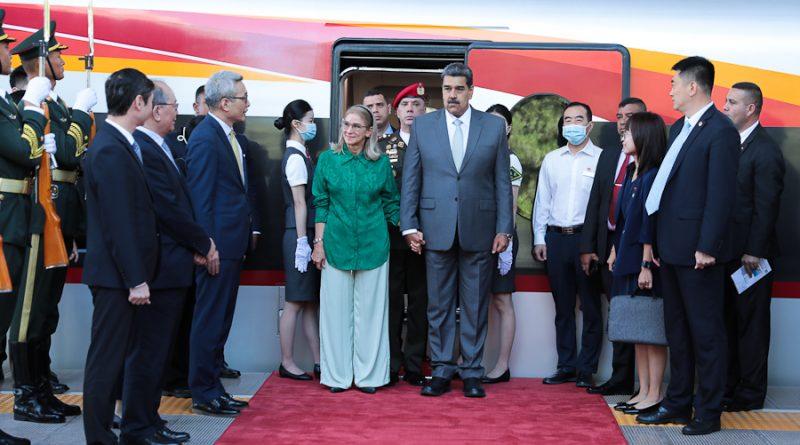After 11:30 am (Local China Time), the president of the Bolivarian Republic of Venezuela, Nicolás Maduro, arrived in Beijing, from the province of Shandong, on the last stop of his historic official visit to the People’s Republic of China, which began on Friday, September 8 with the purpose of deepening the comprehensive strategic partnership, supported by mutual trust and brotherhood for shared development.
Accompanied by the first combatant and deputy to the National Assembly, Cilia Flores, at the end of his journey on the high-speed train that covers the Jinan – Beijing route, which connects 430 kilometers between both cities in just 1:35 hours, is received at the South Station by the special representative of the government of the People’s Republic of China for Latin American and Caribbean Affairs, Qiu Xiaoqi, the director general of the Department of Latin America and the Caribbean of the Ministry of Foreign Affairs of the People’s Republic China, Cai Wei, and the Chinese ambassador to Venezuela, Lan Hu. Likewise, the Venezuelan ambassador to China, Giuseppe Yoffreda Yorio, is present.
The welcome ceremony is carried out by the Honor Guard of the People’s Liberation Army of China, whose soldiers honor their high investiture, marking the first time that a Head of State receives honors at the venue.
Next, in an expression of the ancient tradition of the Asian giant, a group of 26 boys and girls wave flags of both countries in a ratification of the sincere friendship that governs relations between Beijing and Caracas.
This is the fifth time that the Head of State fulfills a work agenda in Beijing, after his stay in 2013, 2015 (twice) and 2018, where he led the signing of agreements in areas of common interest, including investment in strategic sectors, with his Chinese counterpart Xi Jinping.
President Nicolás Maduro’s schedule of activities began in the province of Shenzhen, the epicenter of a meeting with local representatives of the Communist Party of China (CCP) and the exchange of experiences through his visit to the Special Economic Zones (SEZ) exhibition.
In addition, he knew first-hand the determining stages of the Reform and Opening process of Guandong, arranged in the Museum of Contemporary Art and Urban Planning Exhibition (MOCAPE).
His journey continued in Shanghai. In this sense, in addition to learning in depth about the work of the Zhangjiang Artificial Intelligence Island Experimental Center and the Fenglin Medicine Technology Park, he met with the president of the BRICS Development Bank (Brazil, Russia, India, China and South Africa), Dilma Rousseff.
On his third stop, the Venezuelan president visited the province of Shandong, where he spoke with the secretary of the CCP Municipal Committee, Lin Wu.
The diplomatic alliances between Beijing and Caracas date back to 1974. However, it was not until 1999 that they took on a strategic character in the development plans of both nations.
In 2001, the China-Venezuela High Level Joint Commission was established, which has made it possible to establish cooperation agreements in the financial, energy, educational, agricultural, cultural, health, science and technology, oil and aerospace areas, in the latter – In early April- Venezuela became the first country invited by China to participate in the International Lunar Research Station project.
Since last May, Beijing and Caracas have been on a renewed path of diplomatic relations, as a result of the presentation of credentials by Ambassador Lan Hu, who made it a priority to strengthen the ties of fraternal friendship to advance together in the promotion of the multipolar world.
In this regard, during the commemoration of the 49th anniversary of China-Venezuela relations, the diplomat stressed that the comprehensive strategic partnership represents «a fast track to development and prosperity for the people of both countries», also consolidating itself as a model of solidarity and cooperation between developing countries.
